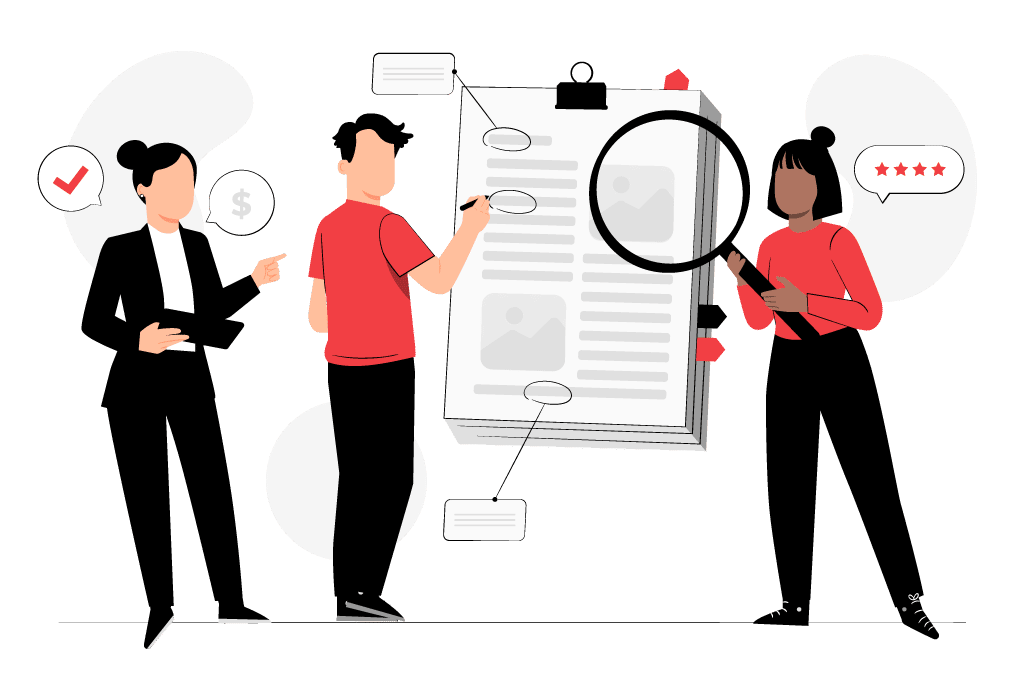Finding the right candidate for a job is about assessing a candidate’s skills, knowledge, and personality to determine if they are the perfect fit for your organization. That’s where employment assessments come into play. These tools have become essential for HR professionals, founders, recruiters, and hiring managers looking to make informed and strategic hiring decisions.
According to lever, Candidates who are notified of their outcome are 3.5x more likely to reapply to a different position with the same company. Now with a talent assessment tool like testlify do it at once with the click of a button.
In this blog, we’ll explore the common types of employment assessments, such as problem-solving tests, computer literacy tests, attention to detail tests, Google Sheets tests, Google Docs tests, and cultural fit tests. We’ll also delve into the when and why of using these assessments, helping you navigate the complex world of talent acquisition and build teams that not only have the right skills but also align with your company’s culture and values. Join us on this journey as we unlock the power of employment assessments in shaping the future of your workforce.
Problem solving test as an employment assessment
Problem-solving tests are an invaluable tool in the world of employment assessments, specifically designed to gauge a candidate’s ability to think critically and solve complex issues. These assessments present candidates with a range of hypothetical problems, puzzles, or scenarios, which they must analyze and find solutions for within a stipulated time frame. For HR professionals, founders, recruiters, and hiring managers, understanding when and how to use these tests can be instrumental in identifying individuals who possess the analytical skills required for certain roles within their organizations.
One key scenario in which problem-solving tests should be employed is when you are hiring for positions that demand a high degree of decision-making, creativity, and troubleshooting skills. This often includes managerial roles, where individuals need to make strategic decisions, or technical roles, where problem-solving abilities are central to success. By using such assessments, you can uncover a candidate’s capacity to handle unexpected challenges, adapt to shifting circumstances, and make sound, rational decisions under pressure.
Additionally, problem-solving tests can be a valuable component of a multi-faceted assessment approach. Combining these tests with interviews and other evaluations allows for a more comprehensive understanding of a candidate’s problem-solving capabilities. This can be especially beneficial when filling positions that require a dynamic and adaptable mindset, such as those in fast-paced industries or innovative startups. In these settings, employees often encounter unique challenges that necessitate creative and logical problem-solving on a regular basis.
In essence, the problem-solving test is a powerful tool for assessing a candidate’s analytical skills, and knowing when to use it is vital for selecting the right talent to fill roles that rely on effective decision-making and creative thinking. Employing such assessments helps HR professionals and hiring managers make informed decisions and build teams capable of navigating the complexities of today’s business landscape.
Computer literacy test
In the modern workplace, proficiency with computers and digital tools is not just a valuable skill but often a necessity. The computer literacy test is an essential employment assessment for HR professionals, founders, recruiters, and hiring managers seeking to evaluate a candidate’s technical competency. This assessment is particularly relevant for roles that require extensive interaction with computers, software, and digital systems.
One key scenario in which the computer literacy test should be used is when you are hiring for positions that demand strong technical skills. These roles can range from software developers and IT professionals to data analysts and graphic designers. By administering a computer literacy test, you can determine whether a candidate possesses the essential computer skills and knowledge required to excel in the role. This includes proficiency in operating systems, common software applications, and the ability to adapt to new technologies as they emerge.
Moreover, computer literacy assessments play a vital role in assessing a candidate’s adaptability and capacity to work efficiently in a digital work environment. As remote work and digital collaboration tools become more prevalent, it is crucial to ensure that candidates are not only technically competent but also capable of navigating the intricacies of a modern workspace.
For startups and businesses operating in technology-driven industries, a computer literacy test is particularly valuable. In such settings, assessing a candidate’s technological aptitude is essential for ensuring the smooth operation of daily tasks and projects. It also aids in identifying individuals who can harness the full potential of digital tools to drive innovation and productivity within the organization.
In summary, the computer literacy test is a powerful assessment tool for evaluating a candidate’s technical competency and adaptability to digital work environments. Employing such assessments helps HR professionals and hiring managers secure candidates who can thrive in roles that require a strong grasp of technology, thereby contributing to the organization’s continued growth and success.
Attention to detail test
Attention to detail is a critical attribute in many job roles, and the attention to detail test serves as a valuable employment assessment to measure a candidate’s precision and thoroughness. HR professionals, founders, recruiters, and hiring managers should consider using this assessment when filling positions where accuracy and meticulousness are essential to job performance.
One primary scenario where the attention to detail test should be employed is when hiring for roles that require precision and accuracy. For instance, quality control inspectors, data entry specialists, medical professionals, and legal experts often work with complex information, and errors can have significant consequences. By using this assessment, you can gauge a candidate’s ability to spot errors, inconsistencies, and irregularities in their work, ensuring that the individual has the necessary attention to detail to excel in such roles.
Furthermore, the attention to detail test is valuable when considering candidates for roles in industries with high regulatory standards or compliance requirements. This includes fields like finance, healthcare, and legal services, where even minor errors can lead to legal or financial repercussions. Assessing a candidate’s attention to detail can help you select individuals who will minimize the risk of costly mistakes and uphold industry standards.
In creative roles, such as graphic design or content creation, attention to detail remains essential. An eye for detail ensures the quality of the final product, making this assessment relevant for such positions. Employing attention to detail tests in these contexts helps in determining candidates who can produce high-quality work with minimal errors or oversights.
In summary, the attention to detail test is a valuable assessment tool for evaluating a candidate’s precision and meticulousness. It is particularly useful when hiring for roles where accuracy and quality are paramount, providing assurance that the selected candidates will excel in tasks where errors can have far-reaching consequences.
Google sheets test and google docs test
In the modern workplace, proficiency with google suite applications like Google Sheets and Google Docs is increasingly essential. For HR professionals, founders, recruiters, and hiring managers, administering Google Sheets and Google Docs tests can be crucial when assessing candidates’ ability to effectively use these common office software tools.
One of the key scenarios in which Google Sheets and Google Docs tests should be utilized is when hiring for roles that heavily rely on these applications. Administrative assistants, content writers, project managers, and other professionals frequently work with spreadsheets and documents for tasks ranging from data management to collaborative content creation. By conducting these tests, you can ensure that candidates possess the necessary skills to navigate and utilize these platforms efficiently.
Moreover, Google Sheets and Google Docs assessments can be particularly useful for startups and organizations that rely on cloud-based collaboration tools. These platforms foster seamless teamwork, but proficiency with them is essential to harness their full potential. Administering these assessments can help identify candidates who can work effectively in such collaborative environments, ensuring a smoother workflow and enhancing productivity.
The value of these assessments extends to various industries and roles. For instance, Google Sheets is essential for financial analysts, while content creators heavily depend on Google Docs. In marketing and sales, proficiency with these tools is crucial for managing campaigns, reports, and documentation efficiently. Employing these tests is vital in ensuring that candidates can not only create but also collaborate and share information seamlessly.
In summary, Google Sheets and Google Docs tests are vital assessment tools for confirming a candidate’s proficiency with commonly used office suite applications. By using these assessments, HR professionals and hiring managers can secure individuals who can navigate these platforms with ease, enhancing productivity and promoting effective collaboration in a variety of roles and industries.
Cultural fit test
Hiring for cultural fit has become a critical aspect of building effective teams and organizations. The cultural fit test is an essential employment assessment that enables HR professionals, founders, recruiters, and hiring managers to evaluate whether a candidate aligns with the values, beliefs, and work culture of their company. This assessment plays a vital role in shaping the cohesive and harmonious dynamics of a team.
One significant scenario where the cultural fit test should be employed is when you are hiring for roles that demand a strong alignment with the company’s values and culture. This includes startups, where the cultural fit can be a make-or-break factor for success. By using this assessment, you can identify candidates who share the organization’s vision, work ethic, and values, ensuring they are more likely to integrate well into the team and work environment.
Additionally, the cultural fit test is particularly important when hiring for positions that require teamwork, collaboration, and interpersonal skills. In such roles, having individuals who not only possess the necessary technical skills but also fit well within the team can significantly enhance productivity and job satisfaction. This is often the case in client-facing roles, sales teams, and any job where employees need to work closely together.
Furthermore, the cultural fit test is instrumental in promoting diversity and inclusion within the workplace. While cultural fit is important, it’s equally crucial to ensure that the organization is not inadvertently fostering homogeneity. By employing this assessment, HR professionals can strike a balance between cultural alignment and diversity, ensuring that candidates from varied backgrounds and experiences have an opportunity to thrive within the company’s culture.
In summary, the cultural fit test is a powerful assessment tool for evaluating a candidate’s alignment with a company’s values and work culture. By using this assessment, HR professionals and hiring managers can select candidates who not only possess the necessary skills but also fit well within the organization, fostering a positive and productive work environment.
Combining assessments for a holistic evaluation
While individual employment assessments like problem-solving tests, computer literacy tests, attention to detail tests, Google Sheets tests, Google Docs tests, and cultural fit tests are valuable tools on their own, often the most effective approach is to combine them for a more comprehensive evaluation of a candidate. This holistic evaluation strategy provides HR professionals, founders, recruiters, and hiring managers with a more well-rounded view of a candidate’s suitability for a particular role or organization.
There are situations where a combination of assessments is the best approach. For example, when hiring for executive positions or leadership roles, where the stakes are high, a multifaceted assessment strategy can provide a more accurate and nuanced understanding of a candidate’s capabilities. These roles often require not only technical proficiency but also strategic thinking, strong decision-making, and alignment with the company’s values. By combining problem-solving tests, computer literacy tests, and cultural fit tests, you can ensure that the candidate possesses a well-rounded skill set and can lead effectively within the organization.
Additionally, certain roles within dynamic, innovative startups or high-pressure environments may benefit from a combined assessment approach. In such settings, employees often encounter unique challenges that demand a balance of technical acumen and cultural alignment. By utilizing a variety of assessments, you can select individuals who can adapt to change, navigate uncertainty, and contribute to the organization’s growth.
This approach allows for a more tailored and nuanced evaluation, ensuring that the candidate not only possesses the necessary technical and cognitive skills but is also a good cultural fit for the company. By employing this combination of assessments, HR professionals and hiring managers can make more informed decisions and build teams that are not only skilled but also harmonious and well-aligned with the organization’s goals and values.
Conclusion
In the ever-evolving landscape of recruitment and HR, the importance of making the right hiring decisions cannot be overstated. Employment assessments have emerged as indispensable tools for HR professionals, founders, recruiters, and hiring managers in the quest to build teams that excel in a diverse range of roles and industries. We’ve explored various types of assessments, from problem-solving to cultural fit tests, and discussed when each is most applicable. As you embark on your journey of talent acquisition, remember that one size does not fit all. The key lies in recognizing the unique demands of each role and organization and applying the right assessments to evaluate candidates holistically. By combining these insights with your experience and expertise, you’ll be better equipped to make informed hiring choices that lead to not just professional success but also a harmonious and thriving workplace. Your talent is your most valuable asset, and with the right employment assessments, you can build a team that propels your organization toward a brighter and more prosperous future.
Optimize your hiring process with the best talent assessment tool: Testlify, So that you never have to worry about another bad hire. Come sign up for free and check out our 1400+ on the job skill tests.







